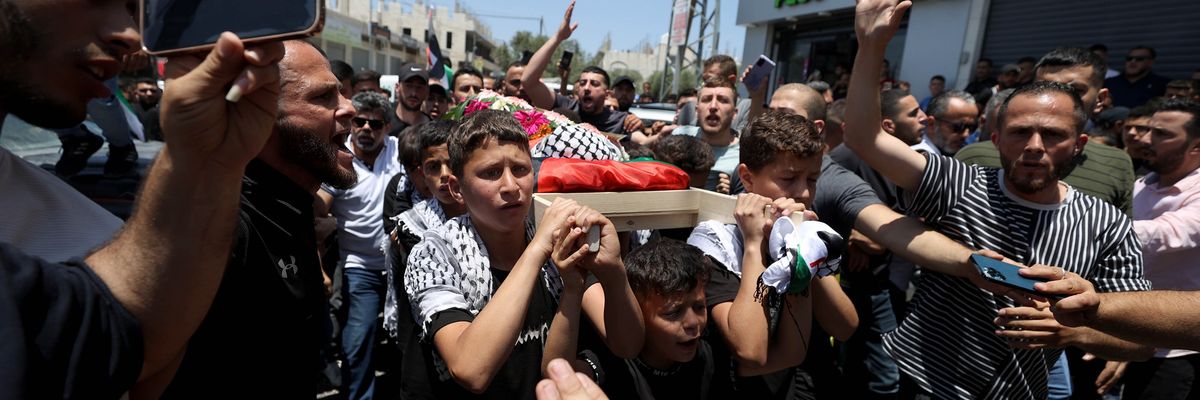Mahmoud al-Sadi was walking to high school in the occupied West Bank late last year when he was
gunned down by Israeli forces, which did not directly acknowledge—let alone investigate—the fatal shooting.
Al-Sadi was among the
dozens of Palestinian children who were killed by Israeli forces in the occupied West Bank in 2022, the deadliest 12-month period for kids in the besieged territory in more than 15 years.
According to a
report released Monday by Human Rights Watch (HRW), this year is on track to be just as bad—and possibly even deadlier—for Palestinian children living in the West Bank, where around a third of the population is under the age of 14.
As of last week, HRW found, Israeli forces had killed at least 34 Palestinian kids in the West Bank this year, facing no discernable accountability for the shootings.
HRW's new report focuses specifically on four recent incidents, including the shooting of al-Sadi—who was 17 years old at the time of his death—and the killings of Adam Ayyad (15), Wadea Abu Ramuz (17), and Mohammed al-Sleem (17).
Citing interviews with witnesses, family members, and others, HRW found that in each of the four cases, "Israeli forces shot the children's upper bodies, without... issuing warnings or using common, less-lethal measures such as tear gas, concussion grenades, or rubber-coated bullets."
Ayyad was shot from behind by Israeli forces earlier this year as they raided Deheisheh refugee camp. HRW's report notes that Ayyad was "with a group of boys throwing stones and at least one Molotov cocktail at Israeli forces."
The soldier who fatally shot Ayyad also shot and wounded a 13-year-old child, witnesses told the human rights group, which has
characterized Israel's unceasing brutalization and oppression of Palestinians as apartheid.
"Israeli forces are gunning down Palestinian children living under occupation with increasing frequency," Bill Van Esveld, associate children's rights director at Human Rights Watch, said in a statement. "Unless Israel's allies, particularly the United States, pressure Israel to change course, more Palestinian children will be killed."
"Palestinian children live a reality of apartheid and structural violence, where they could be gunned down at any time without any serious prospect of accountability,” Van Esveld added. "Israel's allies should confront this ugly reality and create real pressure for accountability."
"Palestinian children live a reality of apartheid and structural violence, where they could be gunned down at any time without any serious prospect of accountability."
Israel's military is operating under the far-right government of Prime Minister Benjamin Netanyahu, whose administration and governing coalition are packed with extremists bent on
fully annexing the West Bank and wiping out Palestinian towns.
Israeli forces frequently
deny responsibility for fatal shootings of children and other civilians, or claim such killings were an accidental result of a firefight with nearby militants.
In al-Sadi's case, HRW found, "the Israeli military did not address or announce any intention to investigate Mahmoud's killing, but
said its forces were conducting arrest raids and exchanged fire with Palestinian fighters. There were no reports that Israeli troops were injured."
"The exchanges of fire occurred when Israeli forces surrounded the family homes of two alleged fighters, and the nearest home was about 320 meters from where Mahmoud was shot," HRW's report states. "A security-camera video, which Human Rights Watch viewed, showed him wearing his school backpack, standing alone, and not holding any weapon or rock, just before he took a step into the street and was shot, his father and the classmate said. The shooting in the distance had stopped and the military was withdrawing when Mahmoud's classmate said he heard a gunshot."
While doing nothing to investigate and pursue accountability for the soldier who killed al-Sadi, the Israeli government "canceled Mahmoud's father's permit to enter Israel, where he worked," HRW noted.
The group observed that Israel "views relatives as aggrieved 'potential avengers' and automatically cancels their work permits as a security measure, harming them through a blanket policy that offers no meaningful individual assessments."
Amid
intensifying attacks in the West Bank by Israeli soldiers and settlers, progressive U.S. lawmakers have demanded action from Congress and the Biden administration to ensure American military aid is not enabling Israeli abuses.
Human Rights Watch argued in its report that "foreign governments such as the U.S., which pledged $3.8 billion in military aid to Israel in 2023, should condition assistance on Israel taking concrete and verifiable steps toward ending their serious abuses, including the crimes against humanity of apartheid and persecution and the regular use of lethal force against Palestinians, including children, that violate international standards, and to investigate past abuses."
"It should suspend assistance so long as these grave abuses persist," the group added.
HRW's report also calls on the International Criminal Court to "expedite" its
Palestine investigation.
